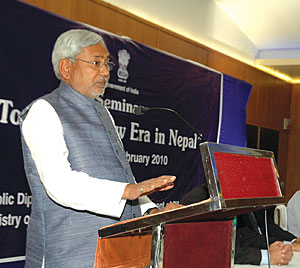 PRASHANT RAVI |
Patna - Bihar chief minister Nitish Kumar cannot stop smiling. Five years ago, Bihar was synonymous with corruption, crime, malgovernance, and was blamed for pulling the rest of India down. This year, it has been rated as the state with the second highest growth in India, and has been feted in the national and international media. Kumar himself has won several 'Politician of the Year' awards.
How did he do it? That was the question all Nepali participants had when Kumar came to speak at the India-Nepal conference held in his state capital earlier this week. And his answers could not have been more relevant for us in a
week when public insecurity is at its peak.
"The mantra is to establish rule of law. Earlier, there was fear and criminals had state protection. Now, we have trials for cases and witness protection. The arms act is strictly applied. There is no interference in investigations. Now people feel a crime will lead to punishment."
Kumar said tackling law and order had been essential to changing the public mood. "People are willing to spend and invest now. Land prices are high. There are record sales of cars. Economic activity has shot up. And we have backed it up with public investment in roads and bridges, which is a prerequisite to get more private investment."
Along with infrastructure, the Bihar government focused on improving education (getting more students, including girls, into schools); health (ensuring 24-hour doctor availability at primary health centres); welfare measures (pensions for differently-abled, the elderly and widows); and modernising agriculture. "My slogan has been growth with justice," declared Kumar.
Sitting in the first row, Dr Baburam Bhattarai was paying close attention. He got up and told Kumar, "Despite our ideological differences, I am inspired by you today. I tried to do similar things when I was finance minister. My question is how did you ensure that high growth benefited all sections of society? Bihar also has a history of land inequality, how have you dealt with it?"
Kumar replied, "All the economic activities have led to job creation. We have ensured gender justice with 50 per cent reservation for women while recruiting teachers. We brought in special schemes for the most deprived Dalit communities. Roads don't have a caste, and everyone has benefited from them." Kumar skirted the land question, perhaps because he has been facing a political backlash from the upper castes against the recommendations of a commission to have land reforms.
UML MP Pradeep Gyawali asked about how Bihar dealt with the politicisation of crime and the criminalisation of politics. Kumar answered, "Rule of law. Who belongs to which party is immaterial and there will be no protection if you are in politics. Once people realised that being in a party would not save them, this trend declined on its own." To NC MP Gagan Thapa's question about armed groups operating from Bihar that posed a threat to law and order in Nepal, Kumar said he was ready to cooperate if there was specific information. He noted the reverse trend of Indian criminals using Nepali territory was also prevalent.
Kumar stated his belief that many of the changes in Bihar would also benefit Nepal. He cited the repair of Kosi in record time, and the faster port connectivity due to better roads and bridges on the Ganga as examples. "If there are any reservations about India's intentions in Nepal," he said, "please remove them. India is your biggest well-wisher. Go anywhere and there is only a positive feeling about Nepal. We are entirely with you and hope multiparty democracy in Nepal will succeed."
Bhai-bhai?
The India-Nepal conference, with high-level Maoist participation, made it clear India wants to continue engaging with the Maoists. But the differences persist.
India remains doubtful of the Maoist commitment to multiparty democracy and would like to see actual proof of their transformation into a non-violent political party. The Maoists' recent 'national awareness' campaign has sowed further suspicions about whether they will be sensitive to India's security and commercial concerns.
The Indian establishment believes that the Maoists must dismantle their coercive apparatus and renounce violence as the first step to any political settlement. This would entail settling the PLA question so most combatants are absorbed into civilian life, and dismantling the paramilitary structure of the YCL. A question that is asked is: if the Maoists are indeed committed to becoming a democratic party, why do they want their people to be sent to the army?
India is skeptical of the Maoist phraseology of 'multiparty competition', and would prefer them to make a clear commitment to multiparty democracy. In this view, the issue of the democratisation of the Maoists need not be linked to power-sharing.
India has also conveyed to the Maoists the message that that its anti-India campaign could set into motion a chain of events that would not be under anyone's control. Protests by locals in bordering Indian towns against the desecration of Indian national symbols by the Maoists were cited as proof of the hardening of Indian public opinion. India has also taken the obstruction of the Upper Karnali project by the Maoists very seriously, with officials privately warning Maoists of potential consequences.
There is a sense here that non-Maoist political parties in India will not be willing to take the Maoists at face value anymore. Unless the Maoists abide by their past promises, the coming months could see rising confrontation and violence.


